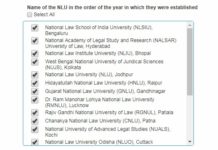 Kian Ganz is the Publishing Editor of Legally India, arguably the most popular online forum for Indian lawyers. An amazingly dynamic person that he is, Kian is fun to talk to about anything and everything. Sandipan De interviewed Kian Ganz on behalf of the CLATGyan team. Here is Kian’s take on just about everything, from the liberalisation issue, legal journalism, law firms in india, corporate law to CLAT and the National Law Universities.
Kian Ganz is the Publishing Editor of Legally India, arguably the most popular online forum for Indian lawyers. An amazingly dynamic person that he is, Kian is fun to talk to about anything and everything. Sandipan De interviewed Kian Ganz on behalf of the CLATGyan team. Here is Kian’s take on just about everything, from the liberalisation issue, legal journalism, law firms in india, corporate law to CLAT and the National Law Universities.
We are very grateful to Kian for taking time out of his very busy schedule and sparing time for CLATGyan.
Cheers!!
1. A brief academic background of yours.
I studied law at Oxford and did the English professional solicitors qualification in London, qualifying at Clifford Chance in London.
2. What inspired you to take up legal journalism?
After a few years as a lawyer I began looking for a change of career and journalism had always interested me, particularly the story-telling aspect – a large part of journalism after all is about finding interesting stories and re-telling them in an engaging way. Journalism in the UK is a very competitive profession but the right opportunity came along at The Lawyer magazine, which was a perfect fit for my skills and a wonderful place to learn and hone the trade. I think that while many professional journalists don’t necessarily set out to report in a business-to-business (B2B) publication, many find that there are interesting stories to tell and break in almost every sector, however niche. Of course in India the B2B segment, not just in law, is in a very nascent stage at the moment.
3. What prompted the move from UK to India?
It was a function of being at the right time and the right place and an almost subconscious split-second decision where things just aligned. The UK market was hit by the economic downturn and India presented an exciting opportunity. I thought that I had the possibility of starting something new and realistic in a fascinating place. And those opportunities do not come along so very often.
4. What do you think of the National Law Schools in India?
Is the purpose behind setting them up defeated because of the hordes of corporate lawyers that they churn out? First of all, corporate law is law too of course and is also important for the country and its economy. Would the big problems of litigation be solved if 90% of national law school grads went to the bar or the bench? No, probably not. And arguably there are far too many litigators in India anyway and enough talented, young litigators do join and push that part of the profession forward. The sickness here is obviously not the bar itself but the disproportionate salaries/retainers that corporate firms can pay to freshers. And the situation is not dissimilar in London, for example, where the split barrister (advocate) / solicitor (lawfirmite) distinction is obviously hard-coded. In England , going to a law firm is the default career choice for most law grads. Going to the bar requires a different spirit and willingness to take risks (or being independently wealthy): you are self-employed and you won’t earn much money to start with doing menial labour for a senior on a stipend. And getting into a good chambers – a prerequisite to a good career at the bar – is tremendously competitive. By contrast, London corporate law firms pay you a fat salary from the get-go, give you paid vacations, benefits, gyms, international secondments, bonuses and fairly secure career advancement. Therefore, and it’s been said many a time in the past, if you wish to make it easier to enter the bar there either needs to a stipulation of minimum living wages for young advocates, or government or other funds that can be more effectively used to assist advocates in the first years of their careers.
5. Your take on the new NLUs cropping up in every state now.
There is definitely a need for more quality legal education in India, although of course just giving a law school the national tag is no automatic guarantee of that. I think significant funding is needed and most importantly, law teaching as a vocation needs to be encouraged with better support, facilities and pay. In addition, historic and new Indian law colleges and national law schools seem to prosper or fail on the basis of the people running these institutions and states need to do more to attract top candidates.
6. The quality of the entrance test, i.e. CLAT, and your idea of what it should ideally be.
I appreciate the difficulty of running a fair entrance test for so many. But it does have to be accepted that while a good score in CLAT is fairly good evidence of intelligence it does not necessarily mean one will make a good lawyer. Ideally we would be in a situation where every intelligent and able student could choose to study law and be sure that they could do it at an institution meeting at least a minimum standard of education and teaching for a reasonable price. For that, law as a career option also needs to become attractive enough to attract enough smart and talented students to come forward who will take the CLAT or other entrance exams.
7. Challenges that legal journalism, especially LI, is facing at present.
I think journalism everywhere is facing the challenge of how to make it pay, of course. In India, print publications are doing very well at that, in the online space less so. Apart from that legal journalism is at a good point of time in India: not much competition, a wealth of stories and major changes to report, and a large audience.
8. How receptive are law firms to the entire idea of people reading about them?
It’s a mixed bag. Some are very professional, transparent and open about it, others go into automatic lock-down mode when talking about themselves or expect only positive stories to be written about them. For decades Indian lawyers have been fairly immune from traditional media scrutiny so it will take some time for that to change. And for some it probably never will.
9. Your opinion about the future of the legal field in India and the challenges in the coming days.
Making litigation a viable form of dispute resolution is the top priority but I fear it is a problem that is almost intractable. Any reform plans in the legal field (and elsewhere in India) are hampered by the sheer number of people dependent on the status quo, down to the ‘lawyer’ typing up affidavits in a district court to the clerks filing reams of paper when it could be done more efficient electronically. And of course all the advocates and law firm lawyers too, who may have carved lucrative niches out of inefficiencies in the current system. Reform is tough but I have no doubt things will improve. One day…
10. The entire liberalisation debate- what is in store for NLU grads.
Foreign law firms coming here won’t change anything overnight. They would hire only a small number of students initially, probably not much more than what they already hire from NLU campuses. The pay probably wouldn’t vastly outstrip the wages domestic top firms pay although it’ll probably result in a general upwards pressure (which exists anyway, if you look at recent trends). In the long term it would mean the market becomes a little more dynamic and there will be great opportunities for junior partners and senior associates. As even most opponents of liberalisation say, it is inevitable. But contrary to what those opponents and also some proponents claim, it won’t quite be a revolution but more of a gradual evolution of the market.
11.Future plans for LI.
Legally India has been a very flexible beast from the start and it is hard to predict exactly. The main strategy has been to produce unique, interesting and important content and to help grow a community around India’s legal world. I hope that we can continue doing that and come up with new ideas while staying independent, relevant and fresh.
12. Your advice for law school ites who want to avoid the corporate law firms and want to pursue something different, case in point legal journalism.
I can’t offer much personal experience here but at least in the UK, even if labelled with the tag lawyer you can do pretty much any career you want except for the really technical disciplines. Law is a great grounding for many things, particularly professions related to writing and doing business or projects in the real world. Knowing the law takes away the fear of the outside world more than many other subjects, although that is also counter balanced by many lawyers being traditionally risk averse (indeed, knowing too much about the theoretical pitfalls of the law can be a scary thing!). So while in India you may be a little more silo’d once you graduate as a lawyer, there are numerous examples of law grads who have broken out into something other than just politics. To a certain extent (and there are obviously limits), what you do and how you do it is determined by yourself less than by your surroundings.
13. Your tips for law school aspirants.
My main piece of advice would be not to stress too much about which law school you get into as long as it is in a decent location where you wouldn’t mind spending five years and that has a strong student community. Much of the rest is up to you and how much initiative you show in college – a majority of what you take out of college will be about whom you meet, befriend and what you do with it, not what the university spoonfeeds you or how nice your hostels are. Take GLC Mumbai, for example, which as an institution arguably provides far less than any other law school. But students have made it what it is and continue to be successful. In fact, the same goes for any national law school too. While a decent level of teaching and infrastructure exists, students seem far more active and involved in almost every facet of campus life than at most UK or US universities for example.
14. Views on CLATGyan.com.
I have been very impressed with CLATGyan ever since I first stumbled across it. I think it is a shame that for a while now getting into a good college has been almost the exclusive preserve of those who could afford a good English-language school and expensive coaching classes. Anything that levels the playing field should be applauded and CLATGyan is therefore a wonderful initiative. The articles are excellently written, pervasive and thoroughly professional.
[Questions with regard to this interview may please be addressed to asad@clatgyan.com. To discover Kian Ganz and the brilliant work he is doing please visit www.legallyindia.com ]















Nice!
Good Job Done!
Excellent article and I love this guy !
Brilliant person he is, no doubt!
We exchanged a few mails long time back. His take on anonymous commenters is hilarious. 😀
Oh and fantastic article.
agree.hats off!!!!
“Any reform plans in the legal field (and elsewhere in India) are hampered by the sheer number of people dependent on the status quo”
Very, very profound!
Law is a very good profession to be in.You dont need to mindlessly solve maths and physics problems,instead u solve real PROBLEMS!!!!!!!!!!
Each profession has its own importance.. Please respect.
And I guess you are a hypothetical “lawyer”… But in real, lawyers complicate things. LOL!!
nope….lawyers don’t complicate things….they solve….i guess u should be in iit……dont speak about law and lawyers in that manner…..i am not going to take it……i dint come to a iit site and say that iit is bullshit ryt..? so y are u so freaked out..?
well…..this is a CLAT based site…..not a IIT orAIEEE based site right….????
It was you who MINDLESSLY opened the topics of physics and mathematics in the first place.
arre…so what’s the problem………if ur so interested in phy n maths…….go and write IIT!!!
I hate the entire IIT AIEEE rat race. I subscribe to the ” we are different. we are law school-ites” point of view.
yay….same here Sandipan… I TOTALLY AGREE WITH U….i think most of the people who do IIT n stuff don’t really have any sort of interest in it….they just do it so they can fulfill their parent’s unfulfilled “DREAMS”and because they force them to…..but it’s quite opposite in law….no one does law to please someone else……it’s the “INTEREST” factor. 🙂
Sir. I am a clat aspirant too. But it is not right to speak ill about those institutions and people. Just express each one’s opinion (as you have by starting with an “I”) rather than giving MINDLESS judgments like Adithya.
^^ absolutely. 😀 Law is way cooler. Out of the box. Stimulating. And simply not the ‘run of the mill’
Meet us. Not just academically excellent, but professionally competent. No, not ‘single minded’ followers, but the leaders. Ask us. We will provide you the access to justice.
No, we do not provide ‘cheap labor’ to an MNC. And oh look, we handle it. 🙂 😀
Bhaiyon (aur unki beheno)
CG is too good a place for stupid flamewars.
How about some productive clat-based discussions.. 🙂
P.s: Me too, Sandipan! The “IIT” rat-race repulses me as well.
But sadly even the CLAT is heading towards a rat-race type experience.
Thanks Sandipan for your very kind words and great interview questions.
And thanks also to all the nice commenters, a welcome change from the anonymous commenter abuse on Legally India 😉
Best of luck on CLAT and law school everyone!
Kian
I too feel that anonymous comment on LI have increased way too much.
I dont quite undertstand, why people rather than saying what they want to say, with their actual names prefer Anonymity…
They should have authenticity on atleast what they believe and what they write…
Great interview, respect your views on NLU’s and the fact that LAW is a basic education, it opens your boundary to anything and everything-not the opposite.
Thank you Kian for your time and energy.
Hey sandipan!! Great interview..Hope you remember me!!
People… I hate the rat race too… That is why I did not choose it even though I’m in science stream. I like law… It makes us feel good to be law school-ites.. \m/
i am not the one giving mindless judgements ….i don’t want to argue any more…i just said…..”law is a very good profession …..u dont need to mindlessly solve maths and physics problems …instead u solve real problems”….n Vineet started the whole respect other profession’s stuff….come on mAn….each person has the right to love or hate a particular profession…u can continue to like maths and physics….and i’ll continue to hate it…end of discussion…..
Come on man. You were not giving opinions. You were stating a judgment. Forget it. I started the whole respect thing. But the thing is I hate mathematics because I know what it is in the 12th. Your hair goes Grey.
and yea like Pappu said …CG is too good a place for “STUPID” flamewars….i haven’t come to this site to respect other people’s professions…..i came ‘cos i love “LAW”!!!!!!!!!!
i just love arguing 😀
Hey, two comments came before mine.. I take back the ‘^ absolutely’ Hmmphhh :X That was to be placed directly below Sandipan’s comment :X Oh oh oh. 🙂
thanks… very interesting interview. love to visit this site!!
Is the bashing over?
No. Now it starts at 201.
Great Read!
This is a very nice article. Thank you for sharing.
excellent work done…..
GOOD JOB….
I feel like studying in the UK or USA now. :/
Undoubtedly, the faculty out here is not as competitive as the ones in leading UK and US universities. We need better faculty and wider options to dwell into after 5 years in law school.
Great interview!
You guys are good sports for carrying Kian’s interview, especially after the whole over-sensationalised ‘NALSARgate’ reports on legallyindia. This shows CG’s professionalism. Good stuff.
True 🙂
nice! 🙂